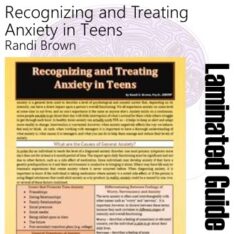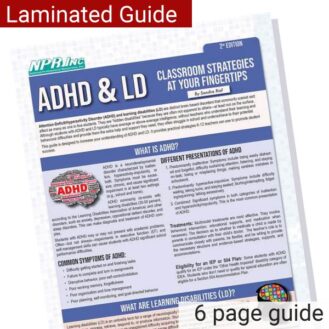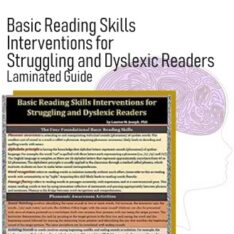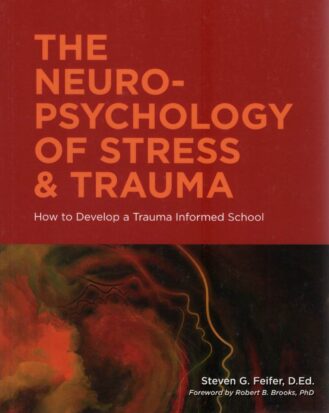
Neuropsychology Fundamentals For Educators – Laminated Guide
$12.95
SKU NEOFUNGUIDE | Reference guide provides educators with important information about brain structures and functions highly related with achievement and academic performance.
Neuropsychology Fundamentals For Educators
This four-page laminated reference guide provides educators with important information about brain structures and functions that are highly related with achievement and academic performance. The guide also includes basic information about the neuropsychology of cognitive processes, such as attention, memory, and executive functions. A centerpiece of the guide explains the brain basis of different types of dyslexia, dysgraphia, and dyscalculia.
The topics included in the guide are:
- The four lobes of the cerebral cortex
- The brainstem’s three basic divisions
- Important neurotransmitters
- Glossary of general brain terminology
- The diencephalon and telencephalon
- Reading, mathematics, and writing and spelling disorders
- Cognitive and emotional executive functions
- Oral language development and disorders
- Visual-spatial processing
- Attention and memory
Author Information: Steven G. Feifer, D.Ed, ABSNP is an internationally renowned speaker and author in the field of learning disabilities, and has authored six books on learning and emotional disorders in children. He has 19 years of experience as a school psychologist, and was voted the Maryland School Psychologist of the Year in 2008, and awarded the 2009 National School Psychologist of the Year. Dr. Feifer is a diplomate in school neuropsychology, and currently works as a faculty instructor in the ABSNP school neuropsychology training program. He continues to evaluate children in private practice at the Monocacy Neurodevelopmental Center in Frederick, MD, and consults with numerous school districts throughout the country. Dr. Feifer has authored two tests on diagnosing learning disabilities in children: the FAR and the FAM, both published by PAR. He can be contacted at feifer@comcast.net
References
Araújo, S., Pacheco, A., Faísca, L., Petersson, K. M., & Reis, A. (2010). Visual rapid naming and phonological abilities: Different subtypes in dyslexic children. International Journal of Psychology, 45, 443-452.
Dehaene, S. (2011). How the mind creates mathematics. New York, NY: Oxford University Press.
Dehn, M. J. (2015) Essentials of working memory: Assessment and intervention. Hoboken, NJ: Wiley.
Elliot, L. (1999). What’s going on in there? How the brain and mind develop in the first five years of life.
New York, NY: Bantam Books.
Feifer, S. G. (2011). How SLD manifests in reading: In D. Flanagan & V. C. Alfonso (Eds.), Essentials of specific learning disability identification. Hoboken, NJ: Wiley.
Feifer, S. G. (2013). The neuropsychology of written language disorders: A framework for effective
interventions. Middletown, MD: School Neuropsych Press.
Feifer, S. G. & DeFina, P. A. (2005). The neuropsychology of mathematics: Diagnosis and intervention. Middletown, MD: School Neuropsych Press.
Feifer, S. G., & Della Toffalo, D. A. (2007). Integrating RTI with cognitive neuropsychology: A scientific approach to reading. Middletown, MD: School Neuropsych Press
Feifer, S. G., & Rattan, G. (2009). Emotional disorders: A neuropsychological, psychopharmacological, and educational perspective. Middletown, MD: School Neuropsych Press.
Geary, D. (2004). Mathematics and learning disabilities. Journal of Learning Disabilities, 37, 4-15.
Goldberg, E. (1989). Gradiental approach toward neocortical functional organization. Journal of
Clinical and Experimental Neuropsychology, 11, 489-517.
Hale, J. B., & Fiorello, C.A. (2004). School neuropsychology: A practitioner’s handbook: New York, NY: Guilford Press.
Kandel, E. R. (2006). In search of memory: The emergence of a new science of the mind: New York, NY: Norton.
Kolb, B., & Whishaw, I. Q. (1995). Fundamentals of human neuropsychology. New York, NY: W.H. Freeman and Company.
Miller, D. C. (2013). Essentials of school neuropsychological assessment (2nd ed.). Hoboken, NJ: Wiley.
Pinker, S. (1994). The Language Instinct. New York, NY: HarperCollins Publisher.
Posner, M. I., & Rothbart, M. K. (2007). Educating the human brain. Washington, DC: American Psychological Association.
Skagerlund, M. S., & Traff, U. (2016). Number processing and heterogeneity of developmental
dyscalculia: Subtypes with different cognitive profiles and deficits. Journal of Learning Disabilities, 49, 36-50.
SKU NEOFUNGUIDE




